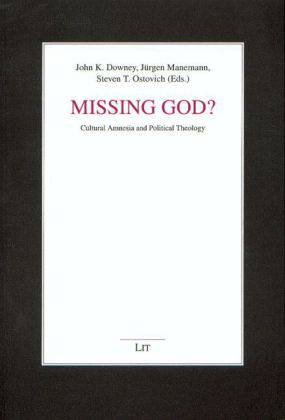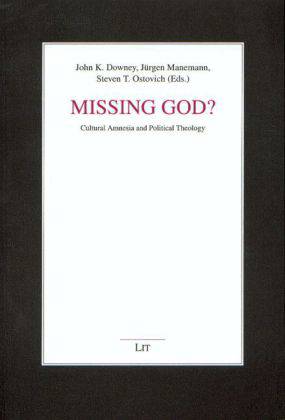
- Afhalen na 1 uur in een winkel met voorraad
- Gratis thuislevering in België vanaf € 30
- Ruim aanbod met 7 miljoen producten
- Afhalen na 1 uur in een winkel met voorraad
- Gratis thuislevering in België vanaf € 30
- Ruim aanbod met 7 miljoen producten
Zoeken
Missing God?
Cultural Amnesia and Political Theology
€ 19,95
+ 39 punten
Omschrijving
Domination, objectification, and control seem to be emerging as the virtures of our time. Yet they also seem to misfire in frustration, violence, and resignation. The human voice has shrunk to a whisper, drowned out in the cacophony of consumerism, competition, egoism, and fear. Are we missing God?
Both the question and its answers are ambiguous. God may be missed in different ways. Missing God may be a matter of our missing the signs of God's presence in the world. Talk about God and theology have been marginalized as relics of the past. "Missing God" may refer to our often hidden and sometimes misdirected longing for God. The new political theology, derived from the work of Johann Baptist Metz, offers a response to our missing God. It does this as an anamnestic and eschatological resistance to forgetting grounded in a memoria passionis responding to others' suffering. Metz's model of critical understanding sublates the modern variations on the dichotomy of reason and faith and provides an antidote to our cultural amnesia in the mystical-political double-structure of faith.
A political theology takes its shape only when it engages the issues of the times. The essays in this volume are by political theologians and others influenced by Johann Baptist Metz. They sharpen the questions and imperatives which mark political theology today. In addition, this collection testifies to the dynamic continuity of political theology in its German roots and North American developments.
Included articles by Johann Baptist Metz, Matthew Ashley, M. Shawn Copeland, John K. Downey, Matthew L. Lamb, Jürgen Manemann, Bruce T. Morrill, Steven T. Ostovich, Tiemo Rainer Peters, Johann Vento, Johann Reikerstorfer, Bernd Wacker.
Both the question and its answers are ambiguous. God may be missed in different ways. Missing God may be a matter of our missing the signs of God's presence in the world. Talk about God and theology have been marginalized as relics of the past. "Missing God" may refer to our often hidden and sometimes misdirected longing for God. The new political theology, derived from the work of Johann Baptist Metz, offers a response to our missing God. It does this as an anamnestic and eschatological resistance to forgetting grounded in a memoria passionis responding to others' suffering. Metz's model of critical understanding sublates the modern variations on the dichotomy of reason and faith and provides an antidote to our cultural amnesia in the mystical-political double-structure of faith.
A political theology takes its shape only when it engages the issues of the times. The essays in this volume are by political theologians and others influenced by Johann Baptist Metz. They sharpen the questions and imperatives which mark political theology today. In addition, this collection testifies to the dynamic continuity of political theology in its German roots and North American developments.
Included articles by Johann Baptist Metz, Matthew Ashley, M. Shawn Copeland, John K. Downey, Matthew L. Lamb, Jürgen Manemann, Bruce T. Morrill, Steven T. Ostovich, Tiemo Rainer Peters, Johann Vento, Johann Reikerstorfer, Bernd Wacker.
Specificaties
Betrokkenen
- Uitgeverij:
Inhoud
- Aantal bladzijden:
- 192
- Taal:
- Engels
- Reeks:
- Reeksnummer:
- nr. 30
Eigenschappen
- Productcode (EAN):
- 9783825876517
- Uitvoering:
- Paperback
- Afmetingen:
- 162 mm x 235 mm

Alleen bij Standaard Boekhandel
+ 39 punten op je klantenkaart van Standaard Boekhandel
Beoordelingen
We publiceren alleen reviews die voldoen aan de voorwaarden voor reviews. Bekijk onze voorwaarden voor reviews.






